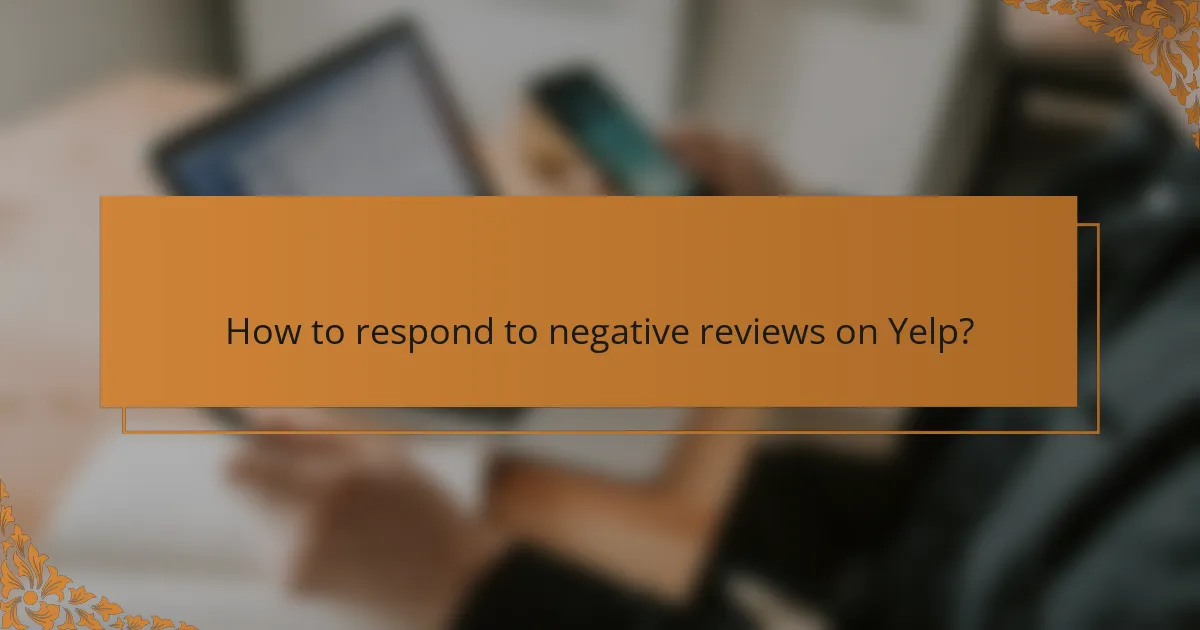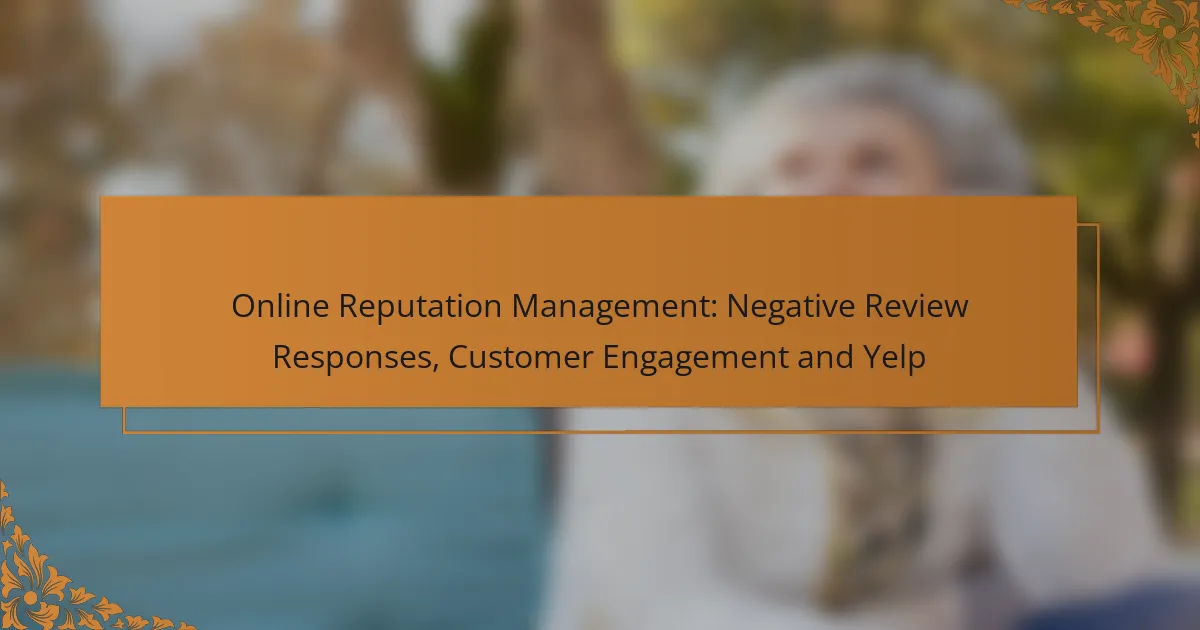Online reputation management is essential for businesses, particularly in the age of digital reviews where platforms like Yelp can significantly influence customer perceptions. Responding thoughtfully to negative reviews not only showcases a commitment to customer satisfaction but can also transform a detrimental experience into a positive one. By implementing effective customer engagement strategies, businesses can build trust and mitigate the adverse effects of negative feedback.

How to respond to negative reviews on Yelp?
Responding to negative reviews on Yelp requires a thoughtful approach to maintain your business’s reputation. A well-crafted response can demonstrate your commitment to customer satisfaction and potentially turn a negative experience into a positive one.
Empathetic acknowledgment
Start by acknowledging the customer’s feelings and experiences. This shows that you value their feedback and understand their frustration. For example, you might say, “I’m sorry to hear that your experience did not meet your expectations.” This empathetic tone can help defuse tension and foster goodwill.
Be specific about the issue they raised, which indicates that you have read their review carefully. Acknowledging their concerns can make them feel heard and respected, which is crucial in online reputation management.
Offering a solution
After acknowledging the issue, offer a clear solution or a way to rectify the situation. This could involve providing a refund, a replacement, or a discount on future services. For instance, you might say, “We would like to offer you a complimentary meal on your next visit to make up for your experience.”
Providing a solution not only addresses the reviewer’s concerns but also shows potential customers that you are proactive in resolving issues. This can enhance your business’s image and encourage others to trust your brand.
Taking the conversation offline
Encourage the reviewer to contact you directly to resolve the issue further. This can prevent public disputes and allow for a more personalized resolution. You might say, “Please reach out to me directly at [your email] so we can discuss this further.”
Taking the conversation offline can also protect sensitive information and allow for a more in-depth discussion. It demonstrates your willingness to engage and resolve issues privately, which can positively influence other potential customers reading the review.

What are effective customer engagement strategies?
Effective customer engagement strategies involve proactive communication and personalized responses to foster positive interactions with customers. These approaches help businesses build trust, enhance satisfaction, and mitigate the impact of negative reviews.
Proactive communication
Proactive communication means reaching out to customers before they voice concerns or issues. This can include regular updates about products, services, or changes within the company, as well as soliciting feedback through surveys or social media. By staying ahead of potential problems, businesses can address concerns before they escalate into negative reviews.
For example, a restaurant might send a follow-up email after a dining experience, asking for feedback and offering a discount on the next visit. This not only shows customers that their opinions matter but also encourages repeat business.
Personalized responses
Personalized responses involve addressing customers by name and tailoring replies to their specific concerns or experiences. This approach demonstrates that a business values individual feedback and is committed to resolving issues. Generic responses can come off as insincere and may further frustrate customers.
For instance, if a customer leaves a negative review about a delayed order, a personalized response could acknowledge the specific issue, apologize, and offer a solution, such as a refund or a discount on future purchases. This level of care can turn a negative experience into a positive one, potentially leading to customer loyalty.

Why is online reputation management important in the UK?
Online reputation management is crucial in the UK as it directly affects how businesses are perceived by potential customers. A positive online presence can enhance credibility, while negative reviews can deter new clients and impact sales.
Impact on consumer trust
Consumer trust is significantly influenced by online reputation. In the UK, many customers rely on reviews and ratings when deciding which businesses to engage with. A strong reputation can foster trust, while a series of negative reviews can lead to skepticism.
To build trust, businesses should actively manage their online presence by responding to reviews and addressing customer concerns promptly. Engaging with customers shows that a company values feedback and is committed to improvement.
Influence on purchasing decisions
Online reputation plays a pivotal role in shaping purchasing decisions among UK consumers. Studies indicate that a majority of shoppers read reviews before making a purchase, and a high rating can significantly increase conversion rates.
To leverage this influence, businesses should encourage satisfied customers to leave positive reviews and address any negative feedback constructively. This proactive approach not only enhances reputation but also drives sales by making potential customers feel more secure in their choices.

What tools can help with online reputation management?
Several tools can assist businesses in managing their online reputation effectively. These platforms enable companies to monitor reviews, engage with customers, and maintain a positive brand image across various online channels.
Yelp for Business
Yelp for Business is a powerful tool that allows businesses to manage their presence on one of the most popular review platforms. By claiming their business page, owners can respond to reviews, update information, and post photos to attract potential customers.
Engaging with customers on Yelp can significantly impact a business’s reputation. Promptly responding to both positive and negative reviews demonstrates that the business values customer feedback, which can enhance trust and loyalty.
Google My Business
Google My Business (GMB) is essential for local SEO and reputation management. It allows businesses to manage their listings on Google Search and Maps, providing crucial information like hours, location, and customer reviews.
Utilizing GMB effectively includes regularly updating business information and responding to reviews. Businesses that engage with customers through GMB often see improved visibility and higher engagement rates, which can lead to increased foot traffic and sales.
Reputation.com
Reputation.com offers a comprehensive suite of tools for managing online reputation across multiple platforms. This service focuses on monitoring reviews, social media mentions, and overall brand sentiment, providing businesses with valuable insights.
One key feature of Reputation.com is its ability to automate review requests and responses, streamlining the process for businesses. This can help maintain a consistent engagement strategy and ensure that customer feedback is addressed promptly, enhancing overall reputation management efforts.

What are the best practices for managing online reviews?
Effective management of online reviews involves consistent monitoring, timely responses, and strategies to encourage positive feedback. By actively engaging with customers and addressing their concerns, businesses can enhance their reputation and foster customer loyalty.
Regular monitoring
Regularly monitoring online reviews is essential for understanding customer sentiment and identifying areas for improvement. Set up alerts for your business name on platforms like Yelp, Google, and social media to stay informed about new reviews.
Consider dedicating time each week to review feedback across different platforms. This practice helps you respond promptly to both positive and negative reviews, showing customers that their opinions matter.
Encouraging positive reviews
Encouraging satisfied customers to leave positive reviews can significantly boost your online reputation. After a purchase or service interaction, follow up with an email or message thanking them and gently requesting a review on platforms like Yelp.
Make it easy for customers to leave feedback by providing direct links to your review profiles. Offering small incentives, such as discounts on future purchases, can also motivate customers to share their positive experiences.

How to measure the effectiveness of reputation management efforts?
Measuring the effectiveness of reputation management efforts involves analyzing various metrics that reflect customer perceptions and engagement. Key indicators include review sentiment, response rates, and overall brand visibility across platforms.
Review sentiment analysis
Review sentiment analysis evaluates the emotional tone of customer feedback, helping businesses understand public perception. By categorizing reviews as positive, negative, or neutral, companies can gauge the overall sentiment and identify areas for improvement.
To conduct sentiment analysis, utilize tools that aggregate reviews from platforms like Yelp and analyze the language used. Look for trends in customer feedback over time, as consistent negative sentiments may indicate deeper issues that need addressing.
For practical application, consider tracking sentiment scores monthly. Aiming for a positive sentiment score above 70% can be a good benchmark, while a significant drop may signal a need for immediate action in your reputation management strategy.
